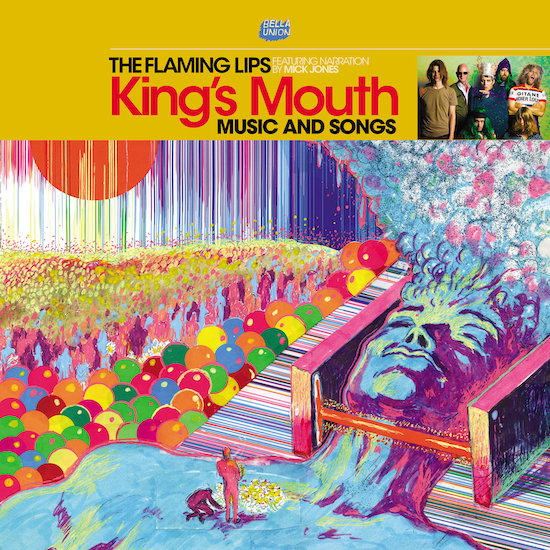Originally released as a limited run of gold vinyl for Record Store Day, King’s Mouth, the fifteenth studio album by The Flaming Lips, began as a giant metallic head. In 2015 the psych-rock band’s frontman, Wayne Coyne unveiled a large-scale art installation in his hometown of Oklahoma City. Described as an immersive listening experience – accented with garish neon hues, the sculpture’s silver exterior resembles a cousin twice removed from The Martian Leader in Tim Burton’s Mars Attacks! – spectators were invited to step inside the head and met with a dangling kaleidoscopic light show accompanied by fourteen minutes of music, condensed from the album’s forty-one minute duration. In truth, the finest moments of King’s Mouth could easily be edited to fourteen concise minutes. Alas, The Flaming Lips never set out their stall to be succinct when they began three decades ago.
Since the original inception of King’s Mouth four years ago, Coyne married his partner Katy Weaver in an enormous plastic bubble. Obviously. Earlier this summer, the couple welcomed their first child, a son named Bloom. Naturally. Musically, the band collaborated with Miley Cyrus for Miley Cyrus & Her Dead Petz before sharing their own sultry effort, Oczy Mldy in 2017.
On this, their first record without producer David Friddman since 1993’s Transmissions from the Satellite Heart (a collaboration with Keith Cleversley), the band deliver twelve meandering arrangements that flit between pensive instrumentals (‘Mother Universe’), New Age nursery rhymes (‘Giant Baby’ and ‘How Many Times’, the latter’s verses structured with Coyne counting to eighteen before exclaiming, “We’ll stop counting at 10 billion times.” At least the listener is spared of that prolonged monotony), and 1970s-flavoured grooves across the closing tracks.
Based on the tragic tale of a beloved king (“The king of their hearts in the city / He’s the king of all houses and homes”) narrated by The Clash’s Mick Jones, the arrangements have cinematic ambitions plagued, however, by lethargy and little suspense. Told through a combination of Jones’ deadpan delivery and sporadic displays of falsetto responses from Coyne, the story struggles to captivate until the third and final act which focuses on the death of the king. The prevalent theme of death creates wistful strands throughout that tie the songs together. Notably, ‘The Sparrow’s’ sombre guitar picking steers the melody as it evolves into a myriad of textures, each granted enough time and space for the listener to digest the woozy drum beats and whomping bass lines before dispersing into a minimal soundscape of Coyne’s cadence soaring above. Its lush tonal dexterity immediately makes it a stand-out moment.
Amid celestial synth chords and floaty strings, there’s an airiness that contributes to a more appealing run of songs in the second half of the record. ‘All For The Life Of The City’ sounds like a psych version of what can be best described as a Paul Simon folk song embellished with shimmering harp flourishes and bumbling bass lines which will prompt involuntary side-to-side head bopping. Elsewhere, ‘Feedaloodum Beetle Dot’ and ‘Dipped In Steel’ are mild takes of Frank Zappa and the Mothers of Invention’s buoyancy through fuzzed and scuzzed instrumentation.
The final couplet, ‘Mouth of The King’ and ‘How Can A Head’, hark back to the original concept of King’s Mouth when Coyne ponders on the latter, “How can a head hold so much?” It inspires thoughts about infinite imagination and the endless possible responses people have to music, especially when experienced inside a severed silver head in an art gallery. It is in that setting, unfortunately, which appears to be the most appropriate for The Flaming Lips’ latest release as neither the story or music are dynamic enough to hold the listener’s attention over an extended period.



